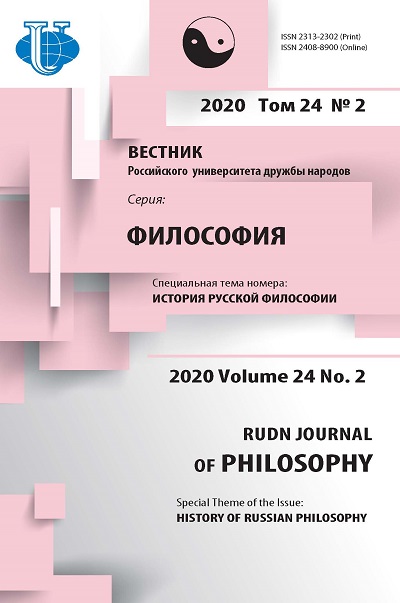From Dialogical Ontology to the Theory of Semiosphere: the Idea of the Dialogue of Cultures in the Philosophical Concepts of M. Buber and Yu. M. Lotman
- Authors: Volkova A.A.1
-
Affiliations:
- Universarium Distance Education Inter-University Platform
- Issue: Vol 24, No 2 (2020): HISTORY OF RUSSIAN PHILOSOPHY
- Pages: 276-285
- Section: SOCIAL PHILOSOPHY
- URL: https://journals.rudn.ru/philosophy/article/view/23681
- DOI: https://doi.org/10.22363/2313-2302-2020-24-2-276-285
- ID: 23681
Cite item
Full Text
Abstract
Today, the dialogue is regarded as a basis for cultural being, while the dialogue of cultures has become a key notion in modern philosophical thinking. The concept of dialogue has been transformed over the past century, acquiring new meanings and changing its internal content from understanding it as an ordinary exchange of information to a complex creative interaction and mutual influence of different cultural and value consciousnesses. Not only different personalities, but entire ethnoses, cultures, and civilizations may become subjects of the dialogue, thus increasing the dialogue functionality up to the means of developing inter-cultural, inter-ethnic and inter-civilizational relations and accentuating commonality of the global historic process and cultural heritage of mankind. Appearing as a form of interpersonal relations in the ontology of M. Buber, who was one of the first to focus on the transition of relations from "subject-object" to "subject-subject", the concept of "dialogue" has become an important philosophical concept throughout the mid-XX century. Brand new turn of development of the theory of dialogue, and the entire human culture in General, was due to the concept of Semiosphere Yu.М. Lotman. The article deals with genesis of the philosophical concept of the dialogue between cultures in the 20th century. The focus is on its emergence - in the early 20th century - in M. Buber's theological concept and at the highest point of its development in Yu. M. Lotman’s semiotic philosophy.
About the authors
Anastasia A. Volkova
Universarium Distance Education Inter-University Platform
Author for correspondence.
Email: dead-ligeya@mail.ru
the main Methodologist
3 Ostapovsky Drive, Moscow, 109316, Russian FederationReferences
- Бердяев Н.А. О назначении человека. Опыт парадоксальной этики. Париж: Современные записки, 1931. 320 с.
- Бубер М. Я и Ты. М.: Высшая школа, 1993. 175 c.
- Бубер М. Два образа веры. М.: Издательство АСТ, 1999. 590 c.
- Длугач Т.Б. Диалог в современном мире: М. Бубер — М. Бахтин — В. Библер // Историко-философский ежегодник. М., 2015. С. 191—242.
- Лифинцева Т.П. Философия диалога Мартина Бубера. [Электронный ресурс]. URL: http://philosophy2.ru/iphras/library/lifinceva.html (дата обращения 28.05.2018).
- Лотман Ю.М. Внутри мыслящих миров. Человек — текст — семиосфера — история. М.: Языки русской культуры, 1996. 464 c.
- Лотман Ю.М. Статьи по семиотике и топологии культуры. Таллин: Александра, 1992. 479 c.
- Панова Л.Н. М.М. Бахтин и Ю.М. Лотман: диалог о диалоге // Вестник Московского государственного университета культуры и искусств. 2009. № 6. С. 57—60.
- Chistyakova O.V. Russian Religious Philosophy as the Basis for State Identity. Journal of Eurasian Research. 2017. V. 2. No. 1. P. 13—17.
Supplementary files















